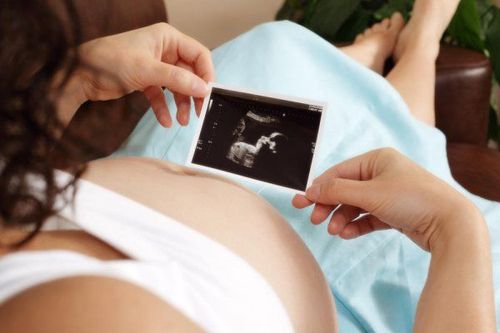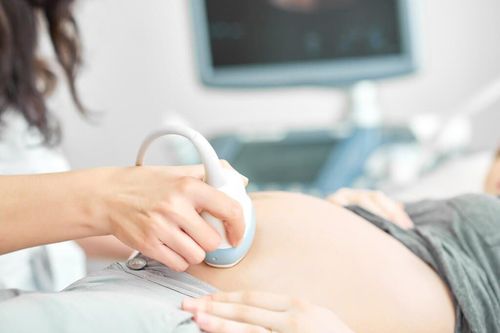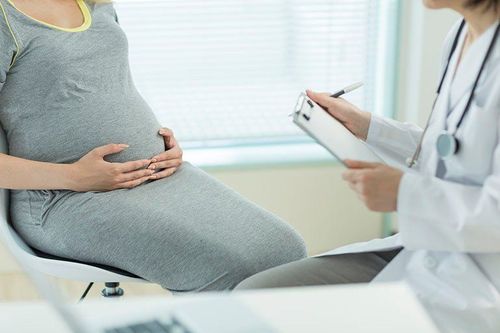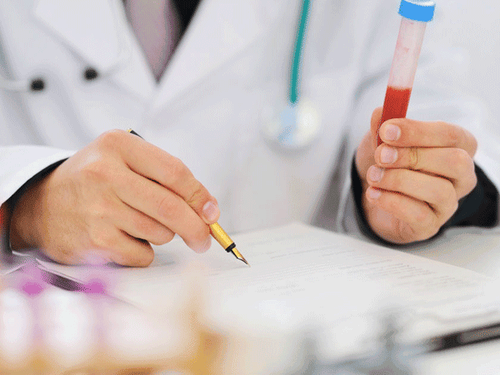This is an automatically translated article.
The article was professionally consulted by a Doctor of Obstetrics and Gynecology, Vinmec Phu Quoc International General Hospital.The 12-week-old fetus is an important milestone in the formation process and is the right time to perform basic tests to determine whether or not there are abnormalities in the fetus as well as the health status of the person. mom. There are many tests that every mother needs to do when her baby is 12 weeks old.
1. Mother's blood group test at 12 weeks pregnant
During pregnancy, it is necessary to test for ABO and Rh blood groups because these are two blood group systems that play a very important role in blood transfusion.A rare phenomenon is that the Rh blood group incompatibility between mother and child leads to hemolysis which is dangerous for the baby. Rhesus factor (Rh) is an antigen or protein located on the surface of red blood cells. The D antigen determines the Rh factor. If a person has the D antigen, that person is Rh positive. And vice versa when there are no D antigens ie Rh negative. When an Rh-negative mother comes into contact with the blood of an Rh-positive baby, she immediately initiates an immune response. At that time, the mother's body will produce anti-D antibodies to fight the baby's Rh-positive red blood cells entering her body. If in the future the mother becomes pregnant with another Rh-positive baby, these pre-existing anti-D antibodies cross the placenta and attack the baby's red blood cells causing hemolytic disease. If a newborn baby has Rhesus disease (hemolysis) that is not detected and treated promptly, it can be life-threatening.
Trắc nghiệm: Bạn có hiểu đúng về dấu hiệu mang thai sớm?
Các dấu hiệu mang thai sớm không phải chỉ mỗi trễ kinh mà còn có rất nhiều dấu hiệu khác như xuất huyết âm đạo, ngực căng tức,… Điểm xem bạn biết được bao nhiêu dấu hiệu mang thai sớm thông qua bài trắc nghiệm này nhé!
2. Blood count test at 12 weeks pregnant
Determine the number of red blood cells to early detect whether the mother has anemia or not in order to give reasonable advice during pregnancy as well as planning for the delivery period. Determine the white blood cell count (monocytes, lymphocytes, neutrophils, basophils and eosinophils) to diagnose maternal infections. Finding out the platelet count helps detect the mother's ability to clot, which is of particular significance during labor and delivery.
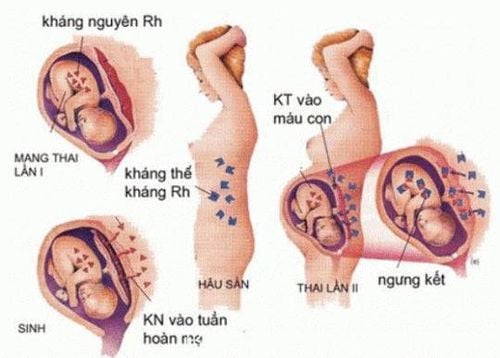
3. Testing for infectious diseases
Testing for infectious diseases at 12 weeks of pregnancy is performing tests to detect diseases that are sexually transmitted, blood-borne, or mother-to-child transmission such as HIV testing, gonorrhea, syphilis, etc. Hepatitis B, Chlamydia... According to studies, about 50-60% of diseases are transmitted from mother to child mainly during labor, when the baby is born by vaginal birth, he will come into contact with directly with vaginal fluids or maternal blood or by maternal-fetal blood exchange. In addition, for cases of difficult birth, the mother's organs are damaged, the risk of infection is higher.4. Urine test at 12 weeks pregnant
Urinalysis should be performed periodically during pregnancy to detect signs of gestational diabetes. The disease can affect the health of both mother and fetus, but can be controlled by diet or daily activities. An excess of protein in the urine can be a sign of an infection that can accompany high blood pressure, putting the mother at risk for preeclampsia.5. Double Test or Triple Test
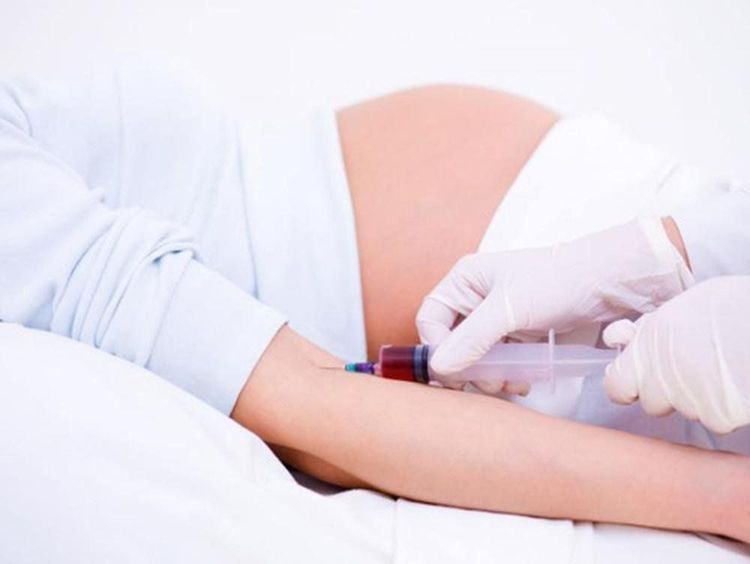
Double Test, Triple Test are two prenatal screening tests that help detect and screen the risk of birth defects in the fetus. These tests are non-invasive and easy to perform.
Double test helps to detect the risk of having Down syndrome, Trisomy 13 (Trisomy 13) or 18 (Trisomy 18). It is done by taking maternal blood combined with the results of the nuchal translucency measurement when the ultrasound determines the risk of the fetus having the disease. In case the Double Test finds the risk of birth defects, a biopsy of the chorionic villus is needed. If the fetus has a borderline risk of birth defects, the mother should have a Triple test done in the second trimester of pregnancy to determine the risk of malformations more firmly The Triple test is done in the second trimester of pregnancy ( 14 to 22 weeks) to detect fetuses at risk for Down syndrome, neural tube defects in the brain or spinal cord, and trisomy 18. This test is intended to confirm the test. Double Test test through 3 indicators: hCG, AFP and Estriol. The difference between the Double test and the Triple test is that the Double test helps to detect the risk of Down syndrome early, while the Triple test determines whether there is a risk of having a baby with neural tube defects. In case the Double test and Triple test show high-risk results, an amniocentesis will help to accurately test whether there is a Down pregnancy or not.
6. Rubella IgM and IgG . test

The test objective is to find Rubella IgG and Rubella IgM antibodies during pregnancy. If you are infected with Rubella for the first time in the first 3 months of pregnancy, the risk of the fetus having congenital rubella manifests in symptoms of blindness, deafness, microcephaly, congenital heart disease up to 90%. Therefore, early testing will help detect rubella in the mother early, avoiding dangerous complications for the fetus.
It can be seen that these ultrasounds and tests during this week of pregnancy play an extremely important role, so mothers should actively perform a full antenatal checkup and choose quality medical facilities to bring the best results. accurate results.
According to the development of pregnancy, from 12 weeks of age, the baby has been relatively complete in terms of morphology and reflexes such as bending and stretching the body, stretching the limbs... This is also one of the three ultrasound milestones. Important deformities are recommended by experts to perform. During this ultrasound, doctors will especially check and screen for early abnormalities of the brain, face, heart, digestive, urinary, extremities and the whole body.
Because your baby is still quite small, a high-end 4D ultrasound system like the GE Voluson E10 will play a very important role in helping doctors at Vinmec detect more than 95% of abnormalities in this period. Packed with the latest technologies, the GE Voluson E10 enables enhanced image quality and penetration, delivering outstanding high-resolution images and easy operation.
Vinmec International General Hospital is equipped with modern equipment and a team of highly qualified and experienced doctors will be a reliable address to help you perform tests with the highest efficiency. We also have an integrated Maternity Care Program 2020 in which tests at 12 weeks of pregnancy promise to bring satisfaction to the mother.
Please dial HOTLINE for more information or register for an appointment HERE. Download MyVinmec app to make appointments faster and to manage your bookings easily.





